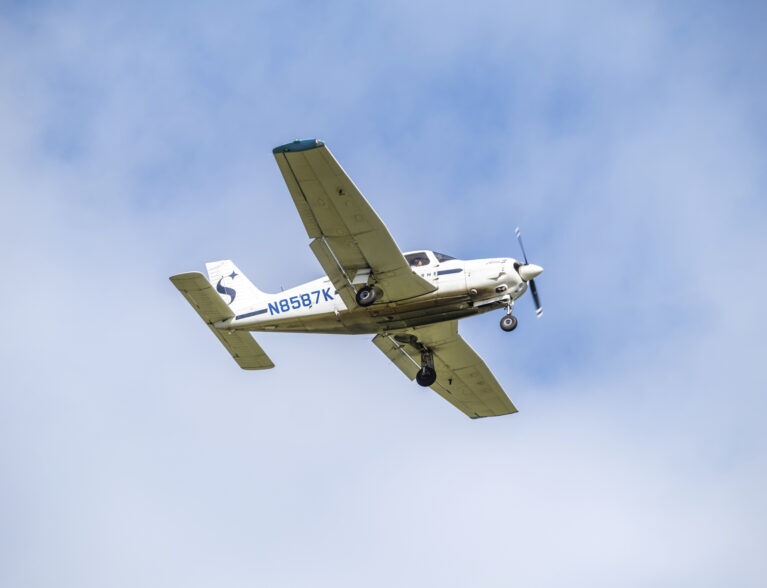
Complaints from local residents about the repetitive and often-annoying noise that accompanies student pilots practicing takeoffs and landings at Vero Beach Regional Airport are nothing new.
“We’ve been getting those kinds of complaints since I joined the staff here in 1996,” Vero Beach Airport Director Todd Scher said last week, responding to questions about the most recent grumbling from affected homeowners in neighborhoods near the airport.
“I do get a lot of calls these days, but over the years, the number seems to ebb and flow,” he added. “Sometimes, people contact us. Other times, they call City Hall. There has been a flight school here since 1966, so we also get repeated complaints from the same citizens.
“They all want the airport, or the city, to do something – change the flight patterns, redirect aircraft traffic away from residential areas, anything to stop the noise – but we can’t.”
That’s because the Federal Aviation Administration has sole authority over the city-owned airport’s aircraft operations. The agency, in fact, owns and staffs air traffic control towers at airports across America, including here.
Federal regulations prohibit local officials from directing air traffic or restricting access to the airfield.
Those obstacles, however, haven’t prevented Ross Power – a recognized local sculptor who was a driving force behind the city’s creation of the Vero Beach Art Village in the historic Edgewood neighborhood near downtown – from trying to launch another grassroots effort.
This time, Power’s mission is to convince the locally based flight schools to embrace his budding battle against the “noise pollution” generated by their training activities and divert the student-piloted aircraft away from otherwise-tranquil residential areas, such as the art village, Vero Isles and Central Beach neighborhoods.
He also wants the flight schools to redirect air traffic away from Memorial Island, where, he said, military veterans visiting the site might get spooked by the sound of the aircraft above.
“I’ve been out there, and all you hear are the airplanes going around and around, multiple planes per minute,” Power said Saturday. “And it’s the same when you go over the bridge. I live in the art village, and I’m trying to bring people into our community, and you’ve got the constant noise from these planes flying over us.
“I can’t sit in my backyard and enjoy the quiet, because of the planes overhead,” he continued.
“Why not take a similar route, but one that goes over a major roadway already inundated with automobile traffic noise?
“We’re not asking for a huge change, just a slight shift in air traffic,” he added. “We’re asking them to be good neighbors and show respect for the community.”
Power said he has been monitoring the aircraft noise from the flight-training aircraft for more than a year, adding that “it’s an issue affecting much of Vero.”
Last month, Power contacted two airport officials. He also sent an email to Iyad Mardi, assistant chief flight instructor at Vero Beach-based Paris Air, to follow up on his request that Paris take the lead in a joint effort by the local flight schools to re-direct air traffic away from residential neighborhoods.
What more can the flight schools do without jeopardizing the safety of their student pilots and the community?
Not much, apparently.
Dan Peterson, who retired in April after serving as the managing director at Skyborne Aviation Academy’s Vero Beach campus, said the flight school already makes every effort to avoid being a nuisance.
“We are sensitive to the community, and so is the air traffic control tower,” Peterson said. “We do try to direct our activities away from neighborhoods as much as we can, but it’s not always possible.
“There are other factors, including the winds, that dictate what we do,” he added. “But safety is always the top priority, especially in flight training. When we’ve got a student pilot taking off or landing for the first time, someone complaining about noise is not my concern.”
Power, however, believes more can be done – and if the flight schools don’t cooperate, he plans to continue his conversation with the FAA. He hopes other concerned citizens will rally to the cause.
“Too many people think nothing can be done,” he said, “so we need to get the community to realize that, if enough people speak up, they can make change happen.”
The city, though, is not likely to back their play.
Scher, a Vero Beach native and lifelong resident who has held a pilot’s license since 1973 and spent 18 years flying professionally, said the FAA’s air traffic control tower decides which runways are used for takeoffs and landings at the airport – and that’s not going to change.
“We don’t want that authority, anyway,” he said. “Can you imagine if we told pilots they must turn to avoid flying over a neighborhood, and then something bad happened? And the pilot says, ‘I wouldn’t have turned, but the airport told me to …?’”
Scher, who was promoted to airport director four years ago, said his staff’s primary responsibility is to maintain facilities, including taxiways and runways, and equipment to ensure safe operations.
But he understands why people complain.
“I live off the west side off the airport, and I hear it,” Scher said, adding that he occasionally gets calls from potential homebuyers who ask about flight patterns and aircraft noise near the neighborhood they’re considering.
“The noise bothers me, and I’m an airplane guy, but there are a lot of reasons airplanes go where they go,” he added. “As a pilot, I can tell you: When I take off, I’m not looking to see where I’m flying over. I’m focusing on other things – my instrumentation, other aircraft in the area, instructions from air traffic control.”



